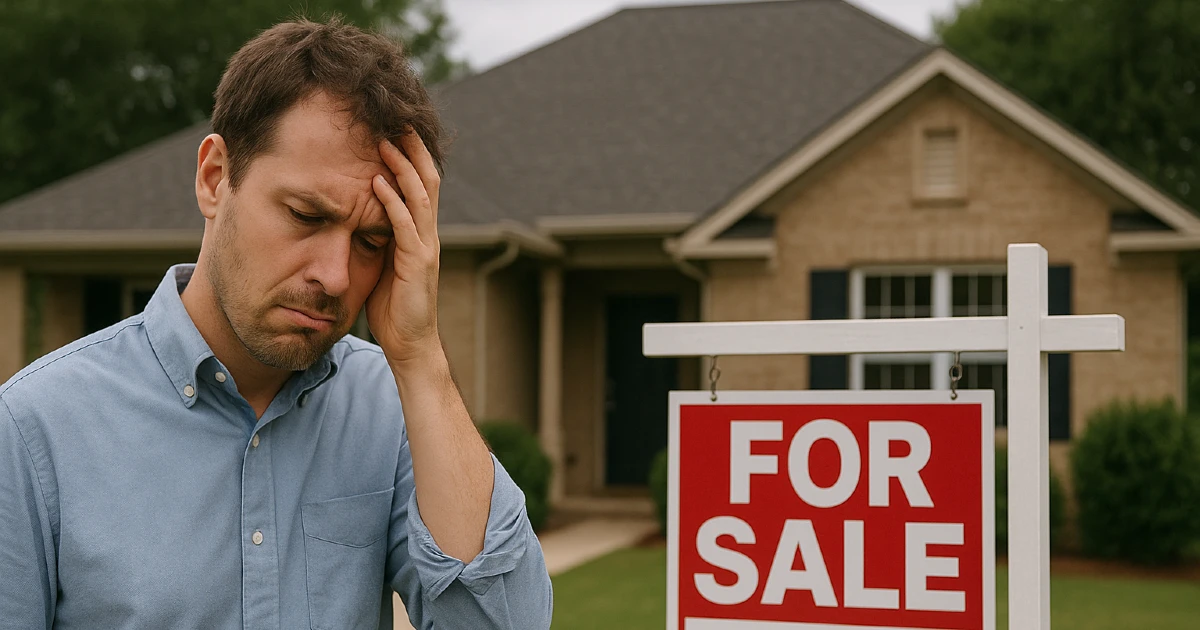With the real estate market as turbulent and pricey as ever, more homeowners are struggling to sell their houses. That’s given rise to an unexpected phenomenon: the accidental landlord.
An accidental landlord is a homeowner who, unable to sell their house or condo, instead de-lists it and repurposes it as a rental property. It’s becoming increasingly common—especially in Sun Belt states like Texas and Florida, which saw massive population influxes during the COVID-19 pandemic in 2020.
Five years later, with remote jobs dwindling and the majority of the workforce back in office, many of those pandemic movers are now trying to sell their homes and relocate again. But in the wake of high mortgage rates and an oversupplied real estate market, sellers are struggling to find buyers. That leaves them with two options: either continue paying the mortgage on a vacant house, or pull the listing and rent it out until conditions improve.
Unsurprisingly, many are choosing to rent. While it can be a savvy way to offset mortgage costs, the growing number of accidental landlords has also added supply to the rental market—creating stiffer competition for traditional landlords who depend on rental income.
In short, this surge has reshaped the world of rental properties, lowering landlords’ ability to raise rents and forcing them to adapt to new real estate market trends. With interest rates still high and no signs of immediate relief, these conditions aren’t likely to change soon.
Let’s take a look at how this trend started, what it means for rental property owners, and how real estate investors can navigate the new landscape.
How the pandemic reshaped the real estate market
Like many housing trends, this one traces back to the COVID-19 pandemic. When the world shut down and most jobs went remote, employees suddenly had more freedom in where they lived. They no longer needed to be in the same city—or even the same state—as their employer.
Meanwhile, states’ approaches to the pandemic varied dramatically. New York, California, and Illinois closed businesses and public spaces, while Florida, Texas, and Arizona kept most things open.
As a result, remote workers fled New York City, San Francisco, Washington D.C., Chicago, and Los Angeles for cities with better weather, lower taxes, and fewer restrictions. Between 2019 and 2022, more than 186,000 people left the New York metro, 165,000 left Los Angeles, and 93,000 left Chicago, according to a 2022 study.
Meanwhile, Sun Belt cities boomed. The Dallas-Fort Worth metro added more than 375,000 people from 2019 to 2022; Phoenix added 321,000; Atlanta and Tampa each grew by about 4%. Businesses followed—Oracle and Digital Realty even moved their headquarters to Austin, which saw a nearly 9% population surge.
With historically low interest rates, many buyers saw this as the perfect chance to purchase homes in these growing markets, locking in long-term mortgages under 3% and fueling further growth.

Why homeowners are struggling to sell in 2025
Fast forward to 2025, and the picture looks different. Only 21.6% of U.S. employees still work remotely, and 61% of companies now require some in-office attendance, according to a July 2025 study. Major employers such as Amazon, JPMorgan, and AT&T have ended remote work altogether.
Those pandemic movers who bought in places like Texas or Arizona now need to sell—but today’s real estate market isn’t on their side.
After peaking from 2020–2022, home price growth has slowed dramatically. As of July 2025, the median home price sits at $368,581, only 3.6% higher than three years earlier, and it’s been declining month over month since February (per Zillow). Interest rates are back up, with 30-year fixed mortgages averaging 6.56%. Inflation has pushed everyday costs up 9% since 2022, and a softer job market has added pressure. De-listings have surged, up 48% in 2025 from 2024, according to CBS News.
For many, selling means taking a loss—if they can sell at all. That leaves them with a tough choice: keep paying for a house they can’t live in, or turn to short term rentals or long-term leasing to cover some of the costs. And so, the accidental landlord trend has accelerated.
The impact on the rental market
With more homeowners renting out properties, supply has surged. In real estate, more supply with steady demand means lower prices—and that’s exactly what’s happening in pandemic-era boomtowns.
Average rents in Austin are down $140 compared to last year, while Dallas rents are down $104, and Phoenix is down $99. Miami saw rents fall as much as $250 earlier in 2025 before beginning to recover.
Jess Pelini, who works as brand manager at TurboTenant, is the quintessential “accidental landlord.” After owning a condo for several years in Denver (which also saw a population surge between 2019-22, growing by 94,000) she and her husband decided it was time to start a family and upgrade to a house. But after talking to a realtor, they didn’t even try to sell; they had locked in such a strong interest rate when they closed that it would have made more sense to keep the condo and rent it out than sell outright, despite being in a desirable neighborhood.
“We had no intention of becoming landlords,” Pelini said. “But it was just easier.”
Pelini listed the condo for rent at slightly below the market rate, and had no trouble finding her first tenant. But when they moved out, around Thanksgiving of 2024, it took them three months to find their second tenant. The season may have had something to do with it – people rarely look to rent around the holidays – but again, this was a desirable neighborhood in a city that had grown since the pandemic.

What landlords can do now
With more competition and falling rents, landlords need to rethink their strategies. That means tracking real estate market trends closely, carefully selecting where to buy rental properties, and adjusting expectations for profit margins.
Markets that boomed during the pandemic, like Texas and Arizona, may no longer offer the same returns. Meanwhile, rents are climbing again in cities like New York and San Francisco—though property values there are also rising.
Landlords also need to be more careful about rent increases, as tenants now have more choices.
“Before, landlords’ ability to raise rent 5 percent every year was definitely in their favor,” Pelini said. “They could do that no questions asked. I think now, they’ve got to be careful... It’s probably a bigger effect on the people trying to buy their first homes, because it’s really hard to do that when costs are going up, and wages aren’t necessarily.
And with tighter competition, tenant retention matters more than ever—making livable conditions, timely maintenance, and fair treatment essential.
“[Landlords] are going to have to treat their tenants right,” Pelini said.
Read more: 5 best states for real estate investors in 2025, based on insurance premiums
Tips for becoming an accidental landlord
If you find yourself joining the ranks of accidental landlords, here are some ways to set yourself up for success:
- Handle maintenance and essential repairs up front. Your standards as a homeowner aren’t the same as a tenant’s. Replace broken appliances and address major issues before renting out. Large purchases may even qualify for bonus depreciation, which can help reduce your tax bill.
- Decide whether to hire a property manager. If you don’t live near the property, managing it yourself can quickly become overwhelming. A property manager can handle tenant communication, maintenance, and leasing—though it comes at a cost.
- Leverage multiple platforms to attract tenants. Don’t rely on just one listing site. Post your property on several rental platforms, including short term rental sites like Airbnb if applicable, to reach a wider audience.
- Screen tenants thoroughly. A background and credit check can help you avoid late payments, property damage, or costly evictions. Treat your rental as a business, even if you never intended to become a landlord.
- Protect your investment with insurance. Renting out a property changes your risk profile. Standard homeowners insurance usually won’t cover tenant-related claims. Make sure you have the right landlord insurance policy in place before signing a lease. Steadily's landlord insurance policies cover everything from fires to storm damage to vandalilsm, as well as loss of rent coverage if the property becomes uninhabitable due to repairs.







.png)
.jpg)
.jpg)


.png)